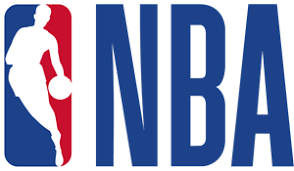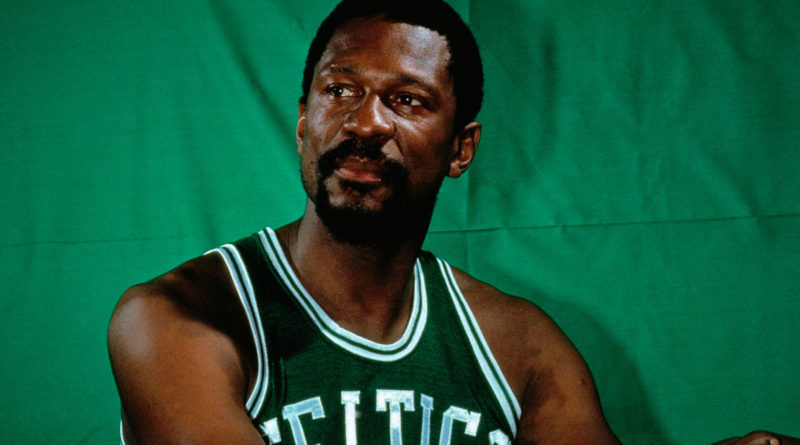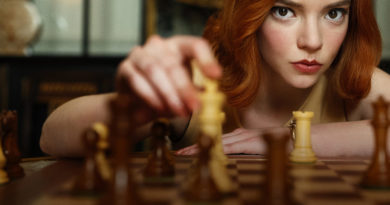NBA | SPORTSMAN OF THE YEAR: BILL RUSSELL


The year was crammed with excellence. In one two-week period Arthur Ashe won the U.S.Nationals at Brookline, went to Forest Hills and became the first amateur to win a major international open tennis championship. Jean-Claude Killy’s triple Olympic triumph brought a fresh, engaging personality to world attention. O.J. Simpson demonstrated that if he wasn’t the best running back in college football history, he was good enough to make that proposition grounds for a valid debate. Bob Gibson and Denny McLain, Bob Beamon and Al Oerter, Lee Trevino and Kip Keino, Debbie Meyer, Peggy Fleming, Dan Gurney, Mickey Lolich,Earl Morrall, Gordie Howe—the honors list for achievement in sport in 1968 is long and distinguished, a fact that adds luster to this choice of Sportsman of the Year. The career of Bill Russell (see cover) is astonishing for its consistent brilliance. Still, in 1968, he brought to it a new dimension; as coach as well as star player of the Celtics—leading and doing—he drove his group of veterans to Boston’s 10th world championship since he joined the team 12 years ago. The photographs at left are highlights of the playoffs for the title between Boston and Los Angeles. At a time when the host of superb Negro athletes commands esteem for performance, Russell has proved his ability to lead athletes of both races—and leadership has been an area of sport inaccessible to black men. What follows is the narrative of a day recently spent with Russell, interspersed with comments on the man by those who know him best, his fellow Celtics.
REFLECTIONS IN A DIARY
The trophies are downstairs in a cellar room that has a covered pool table in the middle, an unstocked bar at one end and posters of Allen Ginsberg and Marlon Brando on the wall. The room is dark and dusty and, unlike most athletes’ trophy rooms, apparently little used. Russell says that one day he hopes to devote the floor space to a large electric train system for his children and also for himself. He’d clear everything out for that, including the trophies. These stand in a tall case against one wall—rows of them, mostly yard-high replicas of players poised, right arm up, to shoot one-handed shots with silver basketballs. They commemorate one of the most remarkable records in sports: 14 years of play at the pinnacle of basketball—two years leading the University of San Francisco to the national championship and then 12 years with the Boston Celtics, leading them to two second-place finishes and 10 world championships.
Russell inserts a key. The heavy glass doors slide on smooth runners. He bends and peers in. He fishes out an Olympic gold medal, as small as a fifty-cent piece in his big hands. He won it as a member of the 1956 Olympic basketball team.
His favorite trophy in the case? He points at one of the less towering, one which marks the beginning of his career, a tall silver figure on a white base. He won it in a tournament promoted by the San Francisco Examiner, as the Bay Area’s Most Promising Young Player. At the time he was 19 years old and a freshman at the University of San Francisco.
He leads the way upstairs. He walks stiffly, bending to get his 6’9″ height through doors.Upstairs the house is lively. His wife Rose and the children are there: Jacob, Kenyatta and Buddha, named after Russell’s heroes in history. A dog is underfoot: Patches, a boxer, nervous perhaps because Russell dislikes him (he tracks in asthma, Russell says) and whose legs Bill mockingly keeps threatening to break. The living room is tasteful—a grand piano, a mobile hanging from the ceiling, African artifacts (spears and masks on the wall), peacock plumes in a vase and a ceiling-high bookcase crowded with volumes, many by Negro leaders and athletes. A complete set of Hogarth’s sketches in bound volumes stretches along the bottom shelf. Russell moves through the room chatting with the children, ducking his head to clear a ceiling lamp on the landing, an instinctive move that he would doubtless make if the room were in pitch darkness.
*****
Ad by:
Memento Maxima Digital Marketing
@[email protected]
SPACE RESERVE FOR ADVERTISEMENT
.
SAM JONES: Russell was slow settling down in Boston. When I came to the Celtics he’d been with them a year and he had just moved from the Hotel Lenox in the city into a different house out in Reading. There wasn’t anything in it for a while except a telephone, a refrigerator and a rocking chair. This one time I was out there—I remember the date, Nov. 2, 1957—Rose was pregnant. Not only that but she was having birth pains there in the living room, rocking back and forth in that rocking chair, and Bill was off somewhere in the only car. I said to her,”Don’t do anything. Wait till Bill comes back.” I’ve had five kids since, but I didn’t know anything then, so I stood over her and I wrung my hands and she rocked back and forth and I said, “Please, please wait till Bill gets back. He’ll know what to do…he can handle anything.”
*****
Out in back of the house is a small pale blue swimming pool, emptied, with a carpet of autumn leaves in the bottom, a chair facing the deep end and a bicycle leaning against the shallow-end side. There are seven or eight bird-houses in the yard; Rose Russell, a girl of lively curiosity, is an amateur bird watcher. Russell himself collects phonograph records. He has 4,000, one of which he selects, a big-beat single, and puts on the turntable. The volume is very high. He talks through the sound: “Track was what I was first interested in at college,because the track team had a sweater that buttoned down the front with S.F. on it for San Francisco. The other sports had nothing like that. The first meet, I went out and jumped 6 feet 7 inches for the sweater.”
Ad by:
Memento Maxima Digital Marketing
@[email protected]
SPACE RESERVE FOR ADVERTISEMENT
.
*****
TOM (SATCH) SANDERS: He’s nicely hooked on clothes. Last year it was Nehru jackets and love beads—his kick as an overgrown love-child. This year it’s Africa—caftans and sandals. We shake our heads when we consider what he might turn up in next year.
Ad by:
Memento Maxima Digital Marketing
@[email protected]
SPACE RESERVE FOR ADVERTISEMENT
.
*****
The record comes to an end and Russell puts on another. “Track is really psychic,” he says. “There wasn’t a guy I jumped against I couldn’t beat if I had the chance to talk to him beforehand. I talked to Charlie Dumas and we tied. After that he never talked and he went on to those world records. I recall we had one big meet with 34 jumpers. They wanted to start the bar at five-eight. I said,’Let’s start it at six-four—let’s get rid of all this garbage.’ I wore a silk scarf, basketball shoes, a track suit and black glasses. I took off the glasses to jump. I had no trouble that time. I loved track. I was completely loose—never got worried or sick before an event…loose as ashes.”
*****
JOHN HAVLICEK: He’s a fantastic athlete. He could have been the decathlon champion. He could broad-jump 24 feet. He did the hurdles in 13.4. I’ve seen him in plays on a basketball court when he not only blocks a shot but controls the ball and feeds it to his forwards, and then he’s up at the other end of the court trailing the fast break and if there’s a rebound there he is, ready for it. He just might be the fastest man on the Celtics. Last year in the playoffs Archie Clark of the Lakers stole the ball three times and he must have had five steps on Russell and a free lane to the basket. Each time Russell caught him and blocked the shot. Think of that. Think of being on the other team. There’s got to be a funny feeling, going for the basket when Russell’s around.
.
Ad by:
Memento Maxima Digital Marketing
@[email protected]
SPACE RESERVE FOR ADVERTISEMENT
*****
There is an invitation to dinner at a friend’s house. Willie Mays is going to be there. In the garage Russell gazes longingly at his Lamborghini sports car, but it is a two-seater and there are too many people to transport. On the way to dinner Russell talks about the defensive skills that are his specialty. “Much of defending is instinctive,” he says. “He-is-going-to-shoot, so obviously I-must-do-this. But it’s also possible to analyze your reactions in certain situations so you can learn to control what you do—so that it’s not an accident anymore. Of course, there are some tricks. If a game is close, two minutes to go, your man’s probably going to take his favorite shot. So you can compensate. And then again there’s luck. Now, naturally,” he adds, beginning his big rackety laugh, “if I was 22 my man wouldn’t be having any luck at all.”
“What begins to go—besides the luck?” someone in the car asks.
“You begin to lose the competitive edge. That’s the only department—and it’s an important one—where I feel any loss. My timing’s as good as it ever was. But night after night, test after test, they come to challenge me—it’s not unlike being a gun fighter. For the last four or five years I’ve had this picture of myself as the gunfighter—the guys coming up who say they saw me when they were in the fourth grade and they’ve watched every move, and practiced them, and how they want to try me. And they keep coming and sometimes I wonder if I still have to prove myself.”
Ad by:
Memento Maxima Digital Marketing
@[email protected]
SPACE RESERVE FOR ADVERTISEMENT
.
*****
JOHN HAVLICEK: He used to throw up all the time before a game, or at halftime—a tremendous sound, almost as loud as his laugh. He doesn’t do it much now, except when it’s an important game or an important challenge for him—someone like Chamberlain, or someone coming up that everyone’s touting. It’s a welcome sound, too, because it means he’s keyed up for the game, and around the locker room we grin and say, “Man, we’re going to be all right tonight.”
RED AUERBACH: The first time I saw him play after we landed him for the Celtics was with the 1956 Olympic team against an all-star team in College Park, Md. He was horrible. He was awful. I thought, God, I’ve traded Ed Macauley and Cliff Hagan for this guy! I sat there with my head in my hands. He came over to see me after the game. He said he wanted to apologize—he’d never played like that. I looked at him and said I hoped he was right because if his play that night was any indication of his ability, then I was a dead pigeon. His first game as a pro wasn’t much, either. Harry Gallatin of the Knicks just ate him up.Russell—well, he didn’t seem to want to hit any one. Timid. He’d just been married, and that doesn’t do a guy any good. At least on a basketball court. So the next time we played the Knicks I thought I’d play Russell at corner and let Arnie Risen play center against Gallatin. Russell came to me and said he wanted to try again against Gallatin. Well, what a job he did on Gallatin—maybe the guy got one shot on him, maybe two. Russell destroyed him. That’s a word you can use about him—he “destroyed” players. You take Neil Johnston—a good set shot and a great sweeping hook shot, a big long-armed guy who played for Philly and was the leading scorer in the NBA the year before. Russell destroyed him. He destroyed him psychologically as well, so that he practically ran him out of organized basketball. He blocked so many shots that Johnston began throwing his hook farther and farther from the basket. It was ludicrous, and the guys along the bench began to laugh, maybe in relief that they didn’t have to worry about such a guy themselves.
*****
Willie Mays has already arrived at the dinner party, looking chilly in a lightweight gray suit.It is a cold autumn day outside. He brightens at Russell’s entrance. He stands in front of the fire, bouncing up and down on his toes, and in reply to how he feels and what he thinks about next season he announces he is only going to play 100 baseball games; the schedule is just too exhausting; in fact, maybe he’ll limit himself to 80. “Well, 80, yes I should think so,” says Russell. “Baseball…really damn brutal. Think of it. You got to get to the ball park at 4 o’clock for a night game. You sit around and shoot some pool. Then you eat a sandwich maybe, and you drink some pop. Then you sit around and do a lot of cussing at each other. Then you pull yourselves together and it’s time for some more pool. After a while you get dressed. Out on the field you lounge around the batting cage. Then you go back and lie down and read the day’s lineup. Finally you go back out and the game begins. The only people who do anything are the pitchers and catchers. What does everyone else do? Well, they lean forward on their toes and they pound their fists into their gloves! [Russell stands and pounds his fists together.] Sometimes they spit on the ground. Just for a change. When the pitcher gets three men out, everybody walks into the dugout where they hold their chins in their hands. [He holds his chin in his hand.] And what then? They stare out at the field until it’s time to go out and start pounding that glove again. It’s really brutal.”
“Aw, come on,” says Mays, bouncing on his toes.
Ad by:
Memento Maxima Digital Marketing
@[email protected]
SPACE RESERVE FOR ADVERTISEMENT
.
*****
TOM (SATCH) SANDERS: He’s a good needler. When I first came to the Celtics I decided we weren’t going to get along. In training camp I was going to be mean and hard and cold and I wasn’t going to have anything to do with anyone—just concentrate on making the team. Well, that lasted two or three seconds. Russell let loose with that big laugh in this restaurant, and I decided that anyone with that much laughter wasn’t anyone to be mean and hard and cold around. So I went over and asked if I could tag along. In his inevitable fashion he turned on me and said no, hell no, certainly not. Well, I thought, I’ve done it now, I’ve shown myself up as weak, just when I was going to be mean and hard and cold. I’d better change back fast. But then, just as I was turning away and getting all set to be aloof again, why he said he was only kidding. Well, that’s like him.He enjoys surprising people to keep them just a bit off balance. When I do something wrong he says, “You just don’t like Boston, do you?”
Ad by:
Memento Maxima Digital Marketing
@[email protected]
SPACE RESERVE FOR ADVERTISEMENT
.
*****
Mays asks Russell about coaching basketball. “It doesn’t seem to me to be all that complicated,” Russell says. “I’ve listened to coaches for so many years. Players react to different stimuli. Some guys you berate; some you praise. If you happen to have a team of guys who need to be yelled at, well, you yell at them and you hope that your manner’s convincing.”
“You miss things?” Willie asks. “Playing and coaching at the same time?”
“I miss some things—guys getting tired, certain guys I don’t play enough. But I have intelligent players who give me advice. I don’t worry. I’m not going to get ulcers coaching. I’m going to give them.”
Ad by:
Memento Maxima Digital Marketing
@[email protected]
SPACE RESERVE FOR ADVERTISEMENT
.
*****
BAILEY HOWELL: There are some advantages to having a player-coach. The great one is that he can inspire you on the floor by example. A coach on the bench can only shout,or maybe send in a substitute. But if things are going badly Russell can takeover. He can get a rebound, begin to block shots. By performing on the floor he can pick up the whole team and set it going right.
JOHN HAVLICEK: His first season was rough—we finished second. He called us in to see him at the beginning of his second season—we were down in Puerto Rico on an exhibition tour—and he looked at us, six or seven Celtic veterans, and said that sitting in that room was a century of basketball experience. He wanted our help—he wanted to tap that knowledge. Of course he told us that his would be the final decision. It helped a lot. He told us to criticize him if we felt he warranted it. One of his problems is that after he gets a rebound he sometimes won’t come all the way down court with the offense. He has a tendency to go to half-court and watch. If I’m on the bench I’ll yell, “Get down there, Russ!” And he’ll start, jump a little, you know, and he’ll prance on down there, that chin striking out, and that goatee of his accentuating the whole business.
“Hey, when you coming out to the ball park?” Mays asks Russell abruptly. “For batting practice, I mean. We’ll fit you out.” Mays is full of enthusiasm. “What size are your feet?”
“Fourteen,” says Russell.
Mays’s enthusiasm is not diminished. “We got fourteens. We got them around somewhere. We’ll get you into something.”
“I hit batting practice in Dodger Stadium,” Russell says. “Mudcat Grant took me out there when he was with the club. I hit the right-field wall.”
“The right-field wall!” Mays is aghast. “Why I can’t hit that wall.” He puts on a pout. “What you talking ’bout?” He begins to stomp around the living room. “What you talking ’bout?”
Ad by:
Memento Maxima Digital Marketing
@[email protected]
SPACE RESERVE FOR ADVERTISEMENT
.
*****
LARRY SIEGFRIED: As a coach he’s not a man of a million words. He’s direct and he’s precise and it has a great effect. We were down three-one to Philly in the playoffs last year and he gave us this little sentence in the dressing room for a pep talk.He said, “We’ve come so far and I don’t want to go home now.”
Ad by:
Memento Maxima Digital Marketing
@[email protected]
SPACE RESERVE FOR ADVERTISEMENT
.
*****
“You play pool?” Mays asks. “You coming out to the house when you’re on the Coast? To play pool?” He is very enthusiastic.
“Oh-oh,”Russell says. “He’s beginning to reel me in.”
“Oh man,”says Mays. “Don’t you gamble none?”
“Always with the wrong person. You ever play golf with Jimmy Brown? One time we’re playing and Brown says, ‘Hey, I can beat you using one club.’ ‘What club?’ I ask him. Well, that was a mistake. He was reeling me in right there. ‘A four-wood,’ he says. I ask him, ‘You mean you chip and putt and everything with a four-wood?’ ‘Yes,’ he says. He’s reeling me in good. Well, I think about it and finally I say O.K. So I get a four on the first hole and so does he. I get a five on the next; so does he. Then I get a three and he does too. Well, I’m one over par after five holes, playing way over my head, and he’s fooling around with that four-wood and he’s dead even with me. Well, I can’t play up to that cat, so he wins the last four holes and $80.”
Mays says he’s pleased to know about that, just in case he runs into Jimmy Brown on a golf course; and in the meantime he’s ready to take on Russell with just a putter.
Russell looks around the room solemnly. “A den of thieves,” he says, and he rocks back and forth with laughter. He stands up. He says goodby to Mays. He will see him on the Coast. Maybe he will play pool. He is sorry to leave but he has a game the next night.
In the car on the way back someone asks, “Hey, did you really hit the right-field fence at Dodger Stadium?”
Russell laughs. He says, “Maybe not so far as that. But we can’t let Willie know.”
Ad by:
Memento Maxima Digital Marketing
@[email protected]
SPACE RESERVE FOR ADVERTISEMENT
.
*****
JOE DE LAURI, the Celtic trainer: He’s friendly and easy with those he likes. But the big concern he has is for the Celtics. Nothing else really matters. That’s why he seems so cold often to the press and the fans. They’re not Celtics. After we won the championship last year he kicked everyone who wasn’t a Celtic out of the dressing room—press, photographers, hangers-on, and also this poor guy who was tending a television camera in the locker room who said he had to have permission to leave it untended, pleading to stay, said he was going to lose his job, and it took three or four minutes to get him out. The press was pounding on the door, furious about deadlines and all, and Russell turned around and looked at us and he asked Howell to lead the team in prayer. He knew Bailey was a religious man—it was also his first year on a championship team—and he knew Bailey would appreciate it. Russell’s not a religious man himself. Sam Jones said, “You pray?” And Russell said, “Yeah, Sam.”













